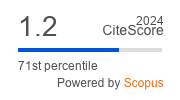A Psycholinguistic Analysis of Inter-Ethnic Views of Ethics
DOI:
https://doi.org/10.29038/eejpl.2022.9.1.tarKeywords:
ethnicity, culture, text analytics, ethics, Bayesian methods, LIWC-22Abstract
In this paper we describe a collaborative, cross-cultural project whose focus is on developing an interactive pedagogy for undergraduate students that delivers a culturally relevant ethical activity, using an internet platform to widen the scope of learning at an international level. The ongoing collaborative project described here is implemented through a website, the Ethical Engineer (https://ethicalengineer.ttu.edu), that provides an open and unique online digital platform for developing a community of students committed to the discussion of ethics from a global perspective. A goal of this project was to gain insights into similarities and differences between Indian, Ukrainian, and USA respondents in their reasoning about a hypothetical ethical dilemma. Two complementary methods of analysis were applied to students’ responses. First, a well-known method for text analysis, Linguistic Inquiry and Word Count (LIWC2022) was used to identify topics and perspectives in students’ essays that distinguished the three groups. These analyses were followed by naïve Bayesian analyses that were used to further identify characteristic conceptual differences between the three ethnic groups. We discuss how the Ethical Engineer platform could be further developed by providing students with immediate substantive feedback to their written responses, in order to extend the learning benefits to students from participation on the website. The analytic methods described here demonstrate ways to gain knowledge of globally-diverse students’ thinking.
Downloads
References
Boyd, R. L., Ashokkumar, A., Seraj, S., & Pennebaker, J. W. (2022). The development and psychometric properties of LIWC-22. Austin, TX: University of Texas at Austin. http://dx.doi.org/10.13140/RG.2.2.23890.43205
Girnyk, A., Krylova-Grek, Y., & Khan, A. (2021). A Psycholinguistic cross-cultural study of the concept 'conflict' in India and Ukraine. East European Journal of Psycholinguistics, 8(2), 51-65. https://doi.org/10.29038/eejpl.2021.8.2.gir
Jordan, K. N., & Pennebaker, J. W. (2016). How the candidates are thinking: Analytic versus narrative thinking styles. Retrieved from: https://wordwatchers.wordpress.com/2016/01/21/how-the-candidates-are-thinking-analytic-versus-narrative-thinking-styles/
Jordan, K. N., & Pennebaker, J. W. (2017). The exception or the rule: Using words to assess analytic thinking, Donald Trump, and the American presidency. Translational Issues in Psychological Science, 3(3), 312-316. https://doi.org/10.1037/tps0000125
Muller, J. (2009). Forms of knowledge and curriculum coherence. Journal of Education and Work, 22(3), 205-226. https://doi.org/10.1080/13639080902957905
Pennebaker, J.W., Boyd, R.L., Jordan, K., & Blackburn, K. (2015). The development and psychometric properties of LIWC 2015. Austin, TX: University of Texas at Austin.
Pennebaker, J. W., Chung, C. K., Frazee, J., Lavergne, G. M., & Beaver, D. I. (2014). When small words foretell academic success: The case of college admissions essays. PloS One, 9(12), e115844. https://doi.org/10.1371/journal.pone.0115844
Pennebaker, J. W., & King, L. A. (1999). Linguistic styles: Language use as an individual difference. Journal of Personality and Social Psychology 77(6), 1296-1312. https://doi.org/10.1037/0022-3514.77.6.1296
Robinson, R. L., Navea, R., & Ickes, W. (2013). Predicting final course performance from students’ written self-introductions: A LIWC analysis. Journal of Language and Social Psychology, 32(4), 469-479. https://doi.org/10.1177/0261927X13476869
Taraban, R., Marcy, W. M., LaCour, M. S., Prasad S. H. C., Zasiekin, S. (2020). Using the Web to develop global ethical engineering students. Advances in Engineering Education, 8(3), 1-21. Retrieved from: https://advances.asee.org/using-the-web-to-develop-global-ethical-engineering-students/
Taraban, R., Saraff, S., Iserman, M., Biswal, R., Marcy, W. M. (in press). Developing a global context for ethical reflection. In S. K. Sia, L. S. Crane, A. K. Jain, and S. Bano (Eds.), Understanding psychology in the context of relationship, community, workplace and culture. Springer Nature Press.
Downloads
Published
Issue
Section
License
Copyright (c) 2022 Roman Taraban, Sweta Saraff , Serhii Zasiekin, Ramakrishna Biswal

This work is licensed under a Creative Commons Attribution 4.0 International License.












 Creative Commons «Attribution» 4.0
Creative Commons «Attribution» 4.0